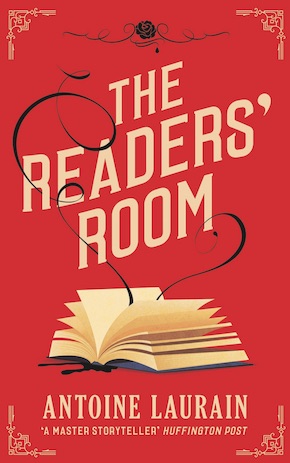Antoine Laurain: Imagined reality
by Mark Reynolds
“Each detail in this complex and time-shifted story is laid out with delicate precision.” European Literature Network
Antoine Laurain’s briskly comic new novel The Readers’ Room takes readers inside the rarefied world of a Parisian publishing house, and revolves around a reclusive debut author known as Camille Désencres whose murder mystery Sugar Flowers has made the Prix Goncourt shortlist. Things take a dark turn when ‘Camille’ emails her editor Violaine Lepage to say, “This book has a life of its own outside of my control. And those who must die will die. All debts will be repaid.” Meanwhile a report from the eponymous readers’ room, where manuscripts are routinely rejected or just occasionally singled out for success, notes: “I would almost say the entire novel is a plea to fate to correct past wrongs.” Sure enough, the police are soon investigating a series of murders that appear to have been predicted in the book, and vital clues are uncovered that link the crimes to the editor’s own past…
MR: The Readers’ Room includes some entertaining observations about aspiring authors dropping copies of their manuscripts into the mail “as if getting rid of a corpse in the woods in the dead of night”, the randomness of being ‘discovered’ and feted as a literary genius, and the elusive allure and arcane traditions of the Prix Goncourt, to win which is “a goldmine – the perfect combination of literary recognition and commercial success.” Do French publishers place too much emphasis on the prize season? And is the industry generally too set in its ways?
AL: There are two ‘rentrées littéraires’ (or publishing seasons) in France every year: in September and in January. It just so happens that most of the best-known literary prizes (the Goncourt, the Renaudot and the Femina) are wedged into January. Many readers will buy a book ‘because it won the Goncourt.’ It’s a fantastic publicity hit. But you can sell well without having won a single prize, and certain authors who netted a prestigious prize have been completely forgotten!
How did you get your own first break in publishing, and what happened next?
I sent my first book The Portrait in the post to some publishing houses, and one of them decided to publish it. Everything that I write about the life of an author in The Readers’ Room is true.
Violaine’s immediate dilemma is that she must persuade the author of Sugar Flowers to make him or herself known to ensure that Bernard Pivot and his colleagues at the Goncourt avoid another ‘Émile Ajar’ fiasco. Can you explain the latter incident?
Romain Gary, a famous French writer, had already won the Goncourt – and you can’t win it twice. So he wrote some novels under the pseudonym of Émile Ajar, and no one knew it was him… and he won the Goncourt twice!
Fiction is an illusion of life, nothing of it really exists, the characters don’t exist… and yet I’ve often had the feeling afterwards that some of my books contained a little piece of the future.”
Aside from Pivot, Stephen King, Marcel Proust, Patrick Modiano, Michel Houellebecq and a few others all pop up in the novel. What is the attraction of frequently dropping real-life characters into your fiction?
I’ve often done that, I find it adds a certain strangeness to fiction. As I answer, I remember that I briefly gave the painter Francis Bacon an appearance in Smoking Kills…
You said recently: “This novel… asks a question that borders on the fantastic or supernatural: Does what we write lead to what ends up happening?” Does it, or can it?
I think that fiction is a particularly unique material to handle. It’s an illusion of life, nothing of it really exists, the characters don’t exist… and yet I’ve often had the feeling afterwards that some of my books contained a little piece of the future, whether it was about me, or my general surroundings. In short, fiction is not innocent, and being a novelist is a pretty strange job!
What did you want to explore in this novel about memory and forgetting?
Secrets, I think.
Your books to date could be grouped together as comic novels combining elements of mystery and quest. Are these also common aspects in the fiction you prefer to read?
The quest is very important for me, as life itself is a quest. I’m sensitive to this idea of a journey of initiation which leads to the solving of a mystery. And also to finding joy and a sense of peace. I don’t think you find many of those kinds of books in France…
Many in the publishing world will recognise your depiction of the often excruciating, occasionally productive author’s lunch. Can you share some of your own experiences of sitting down with an editor or agent for a work-in-progress catch-up?
All the better if you enjoyed that description of author’s lunches – it really fits the bill! I have good relationships with my editors, but we don’t often see each other. I’m not one of those authors who sends off each chapter for feedback as soon as it’s ready. Consequently, I’m not a particularly expensive author lunch-wise!
Your novels are all short, quick reads. Do you write them fast? What is the typical timeframe between starting and finishing a novel, and what are the steps toward completion?
I don’t have the strength to write a 600-page novel, and I quite often find that the author could have done with cutting 200 pages and said just as much. No, I’m not a particularly fast writer, ideally I hit ten pages per day! I’d say a novel takes me around eight months. Sometimes I find the ending somewhere in the middle – it happens even that I write the final paragraph! That’s what I did yesterday, but believe me, there’s work yet to be done…
As long as we still have imagination and that literature retains the power of escapism, all will be well… Even if AI discovers the murderer, it can’t solve the real mystery of the book, for the mystery is human.”
Has your writing schedule been disrupted or eased by the Covid-19 lockdown? And how have recent events affected other aspects of your life?
I’ve hated this period. Completely unproductive artistically. Totally depressing, stuck in the big city with only rapid supermarket excursions to change perspective. And I’m scared it’ll all start again, in one form or another. This era is complicated enough, this is the last thing we need…
There are comical comparisons between the methods in Georges Simenon’s Maigret series and modern police methods. If AI can cut corners in a criminal investigation, is the modern mystery novel under threat?
As long as we still have imagination and that literature retains the power of escapism, all will be well. I love the chapter where Lieutenant Tanche speaks to experimental AI. Even if AI discovers the murderer, it can’t solve the real mystery of the book, for the mystery is human.
The Duchess of Cornwall recently included The Red Notebook in her list of recommended lockdown reads, calling it “a masterpiece of Parisian perfection” – which prompted a rush in sales of your entire backlist. What other unexpected boosts have you received in your writing career?
I have received some literary prizes that I really wasn’t expecting. On that subject, I would highly recommend Thomas Bernhard’s excellent My Prizes, An Accounting. A very funny, very sarcastic book about the literary prizes he’s won throughout his career. However, I was honoured to know that the Duchess of Cornwall is one of my readers – and even more to be the only French writer on the list! I arranged for her to receive a signed copy of The Red Notebook, and she responded by sending me a very charming and thoughtful letter, which touched me greatly.
Paris is invariably the main backdrop to your fiction. Do you feel that readers need to be familiar with the city to get the most out of your books?
My stories take place in Paris as it’s where I was born and where I live. All the better if you know the city, and you spot places that you like, but I don’t think it’s a necessary requirement to enjoy my books. I used to read lots of Henning Mankell, and yet I’ve never been to Sweden.
Jane Aitken and Emily Boyce at Gallic have translated all your recent novels into English (this time assisted by Polly Mackintosh). What is your working process with Gallic, and how does this differ from translations in other territories?
Gallic Books do a fantastic translation job, and I’m so happy to have been with the team for all these years – it’s a lovely story that we started with The President’s Hat and we’ll continue to experience all kinds of surprises and successes together. The main difference with the other translations is that I can read the English ones!
What are you writing next?
A new novel, but I’m afraid that’s all I can say…
 Antoine Laurain is a novelist, screenwriter, journalist, director and collector of antique keys. He is the author of Ailleurs si j’y suis (2007, translated as The Portrait, 2017), The President’s Hat (2013), The Red Notebook (2015), French Rhapsody (2016), Smoking Kills (2018) and Vintage 1954 (2019). The Readers’ Room is published by Gallic Books in hardback and eBook, translated by Jane Aitken, Emily Boyce and Polly Mackintosh.
Antoine Laurain is a novelist, screenwriter, journalist, director and collector of antique keys. He is the author of Ailleurs si j’y suis (2007, translated as The Portrait, 2017), The President’s Hat (2013), The Red Notebook (2015), French Rhapsody (2016), Smoking Kills (2018) and Vintage 1954 (2019). The Readers’ Room is published by Gallic Books in hardback and eBook, translated by Jane Aitken, Emily Boyce and Polly Mackintosh.
Read more
antoinelaurain.blogspot.com
Author portrait © Pascal Ito/Flammarion
Jane Aitken is a publisher and translator from the French.
Emily Boyce is an editor and in-house translator at Gallic Books.
Polly Mackintosh is an editorial assistant and in-house translator at Gallic Books.
@BelgraviaB
Mark Reynolds is a freelance editor and writer, and a founding editor of Bookanista.
@bookanista
wearebookanista
bookanista.com/author/mark

